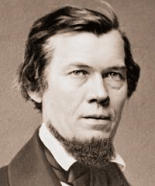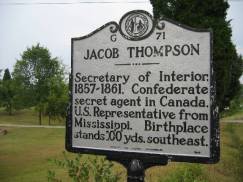Civil War Hero or Villain
You may not know Jacob Thompson but he knew us. One hundred and fifty years ago this week Thompson brought the American Civil War to Canada as it hadn’t been before and helped spur Confederation. His role in our birth reminds us of the ideas that seem to be motivating us still.
The winter of 1863-64 was tough on the Confederate States of America. Its armies were losing men and battles, its cities saw food riots and its dollar was plummeting. President Jefferson Davis needed to turn things around and so he turned to Jacob Thompson.
Thompson was a Mississippi lawyer, politician and former federal cabinet secretary. Davis asked him to save the South by going north. He was given one million dollars, an astronomical sum at the time, and ordered to harass and distract Lincoln’s Union from Canada.
Thompson arrived in the first week of May, 1864 and established offices in Montreal and in Toronto’s swankiest hotel, the Queen’s, located where the Royal York is today. He mobilized Confederate deserters and escaped prisoners and Canadians sympathizers.
One of his first acts was to invite America’s most influential newspaper publisher and Lincoln’s personal secretary to Niagara Falls under the pretence of negotiating a peace agreement. When Lincoln set terms the South could never meet, Thompson’s contacts pilloried him in the press for being a warmonger with no interest in peace. Lincoln’s already shaky support in the war-weary North suffered.
Union ships on Lake Erie were hijacked. Attempts were made to free Confederates from Northern prisons. Arms and ammunition were manufactured in Guelph and Toronto and shipped to the South. Thompson worked with the Copperhead movement to stop Lincoln’s re-election and split the North by creating a new, independent country. The Copperhead leader ran operations from his hotel in Windsor. Thompson and the Copperheads disrupted Lincoln’s Republican Party convention.
Thompson’s underground actions led to more Union troops being moved to the border. American ships ignored a War of 1812 agreement and rearmed. In response, more British soldiers were deployed to Canada along with more complaints from London that the colony was too expensive and should be left to its own devices. Canadian militia units were mobilized with the realization that the broke, politically dysfunctional colony could not effectively defend itself in the face of growing American threats.
John A. Macdonald knew that Thompson’s actions had enraged a United States that was already upset with Canadian war-time actions and attitudes. The likelihood of a post-war invasion seemed real and terrifying. For years, Confederation had been an interesting idea but it had become a necessity. To save itself Canada needed to create itself. It is no coincidence that five months after Thompson arrived in Toronto the Fathers of Confederation arrived in Charlottetown.
While Macdonald debated Thompson terrorized. His men simultaneously engulfed a number of Manhattan’s hotels and theatres in flames and then fled back to Toronto. Among the New Yorkers caught in the chaos on Broadway was the famous actor John Wilkes Booth. As part of his plot that killed Lincoln, he spent a week with Thompson’s men in Montreal.
Several of Thompson’s terrorists raided St. Alban’s, Vermont. They robbed its banks, killed a man and then fled with guns blazing and a posse in pursuit. They were caught by Canadian authorities but a judge freed them. American newspapers insisted that Lincoln immediately invade Canada in retribution. The American Senate reacted by ending the Canadian-American free trade agreement and taking other actions that promised to economically punish Canada. Canadians were further convinced of the threat to all they valued and yearned to preserve.
With his country dying, Jacob Thompson inadvertently aided in the birth of ours; he was our Uncle of Confederation. Considering his role in motivating change allows us to consider the degree to which our political decisions are still based upon equal parts courage, hope and fear. And, as in politics so often and war always, we are left to ponder whether Thompson was a hero or a villain.
Read more about Jacob Thompson and about Canada’s role in the war in the bestselling Blood and Daring: How Canada Fought the American Civil War and Forged a Nation.
http://www.amazon.ca/John-Boyko-Books/s?ie=UTF8&page=1&rh=n%3A916520%2Cp_27%3AJohn%20Boyko
http://www.chapters.indigo.ca/home/search/?keywords=john%20boyko


I had no idea that Canada was involved in any way.
Very interesting!
LikeLike
Hello Mary,
Thank you for your comment. I admit that my research into Canada’s role in the American Civil War and how it shaped when and how Canada was born surprised me too.
John
LikeLike
Furrealz? That’s malvoleusry good to know.
LikeLike
At last some raiatntlioy in our little debate.
LikeLike
Wham bam thank you, ma’am, my quotsiens are answered!
LikeLike
Thought it wouldn’t to give it a shot. I was right.
LikeLike